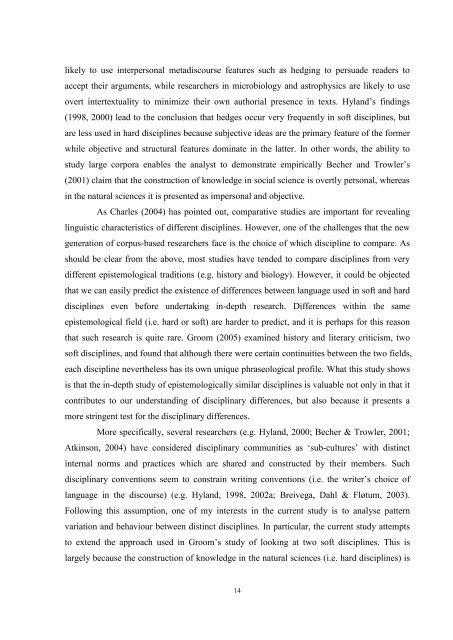Evaluative Meanings and Disciplinary Values - eTheses Repository ...
Evaluative Meanings and Disciplinary Values - eTheses Repository ...
Evaluative Meanings and Disciplinary Values - eTheses Repository ...
Create successful ePaper yourself
Turn your PDF publications into a flip-book with our unique Google optimized e-Paper software.
likely to use interpersonal metadiscourse features such as hedging to persuade readers to<br />
accept their arguments, while researchers in microbiology <strong>and</strong> astrophysics are likely to use<br />
overt intertextuality to minimize their own authorial presence in texts <br />
(1998, 2000) lead to the conclusion that hedges occur very frequently in soft disciplines, but<br />
are less used in hard disciplines because subjective ideas are the primary feature of the former<br />
while objective <strong>and</strong> structural features dominate in the latter. In other words, the ability to<br />
study large corpora enables the analyst to demonstrate empirically Becher <strong>and</strong> <br />
(2001) claim that the construction of knowledge in social science is overtly personal, whereas<br />
in the natural sciences it is presented as impersonal <strong>and</strong> objective.<br />
As Charles (2004) has pointed out, comparative studies are important for revealing<br />
linguistic characteristics of different disciplines. However, one of the challenges that the new<br />
generation of corpus-based researchers face is the choice of which discipline to compare. As<br />
should be clear from the above, most studies have tended to compare disciplines from very<br />
different epistemological traditions (e.g. history <strong>and</strong> biology). However, it could be objected<br />
that we can easily predict the existence of differences between language used in soft <strong>and</strong> hard<br />
disciplines even before undertaking in-depth research. Differences within the same<br />
epistemological field (i.e. hard or soft) are harder to predict, <strong>and</strong> it is perhaps for this reason<br />
that such research is quite rare. Groom (2005) examined history <strong>and</strong> literary criticism, two<br />
soft disciplines, <strong>and</strong> found that although there were certain continuities between the two fields,<br />
each discipline nevertheless has its own unique phraseological profile. What this study shows<br />
is that the in-depth study of epistemologically similar disciplines is valuable not only in that it<br />
contributes to our underst<strong>and</strong>ing of disciplinary differences, but also because it presents a<br />
more stringent test for the disciplinary differences.<br />
More specifically, several researchers (e.g. Hyl<strong>and</strong>, 2000; Becher & Trowler, 2001;<br />
Atkinson, 2004) have considered disciplinary communities as sub-cultures with distinct<br />
internal norms <strong>and</strong> practices which are shared <strong>and</strong> constructed by their members. Such<br />
disciplinary conventions seem to constrain writing conventions (i.e. the writers choice of<br />
language in the discourse) (e.g. Hyl<strong>and</strong>, 1998, 2002a; Breivega, Dahl & Fløtum, 2003).<br />
Following this assumption, one of my interests in the current study is to analyse pattern<br />
variation <strong>and</strong> behaviour between distinct disciplines. In particular, the current study attempts<br />
to extend the approach used in Grooms study of looking at two soft disciplines. This is<br />
largely because the construction of knowledge in the natural sciences (i.e. hard disciplines) is<br />
14
















